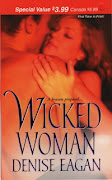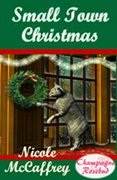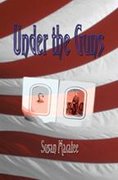Wednesday, August 29, 2007
Victorian Music & Modern times
In this particular one, it's Funiculì, Funiculà, written by Peppino Turco with set to music by Luigi Denza in 1880. I know the tune (to the wrong words) , but the 'real' words make a lot more sense. I hope they'll get the sound of Goofy singing out of my head.
Though I still don't know what funiculi', funicula' means.
http://www.songsforteaching.com/folk/funiculifunicula.htm
http://kids.niehs.nih.gov/lyrics/funiculi.htm
Monday, August 27, 2007
Women & Music
In Women Musicians in Victorian Fiction, 1860-1900 by Phyllis Weliver (ISBN: 0754601269), she begins with For nineteenth-century society, music was a means by which women could display their gentility, education, their physical grace and express their 'selves'. Novelists were quick to employ this recognized way for women to project their personalities, and fictional scenes featuring women musicians served to reinforce or explore and challenge traditional views of the place of both women and music in society.
This was very true. Many women took piano lessons for years, and were the 'entertainment' so to speak at social gatherings. They played all the latest music, from Gilbert and Sullivan to pop-culture songs, to Beethoven and Mozart.
And they sang. Whether in dance halls or their own conservatory, many trained their voices. Mostly. I'm sure there will always be those "American Idol" wannabes who think they can sing but really can't.
Still, no matter how I search the internet, it's incredibly hard to find books, sites, or lists of music from this era. There are operas and plays listed, but not much on the every day level. Typing in a general time, I got something from Wikipedia, but as always with that site, take its info with a grain of salt.
http://en.wikipedia.org/wiki/1882_in_music
Anyone else have site or books on this topic?
Tuesday, August 21, 2007
Music
Here are some children's songs, Nursery-songs.com. Again you can't listen to them only read the lyrics and see the illustrations. Worth it, but I'm not tune-ality inclined.
The Victorian Music Library allows you to borrow sheet music (at a cost). Here's their catalogue.
It was during this era that the gramophone came into use. Emile Berliner patented it, and records, in 1887. He was the first to use flat discs instead of cylinders. And was also the first to be able to mass produce them, making them cost effective and widely available. The first ones were made of glass, then zinc, and eventually plastic. [http://inventors.about.com/od/gstartinventions/a/gramophone.htm]
There are a lot of other musical inventions and I'm sure a lot of other websites out there with songs and recordings you can listen to. Anyone have a favorite?
Tuesday, August 14, 2007
BELLEVUE HOUSE
On a recent trip to Kingston, Ontario, I visited Bellevue House. This home was built in 1841 by a leading merchant in the area. Fortunately for us, the home was rented in 1848 by the man who would become our first Prime Minister, Sir John A. Macdonald. This happy fact meant that the house was preserved to that time and is now a National Historic Site--open to the public.

Bellevue House is an early version of the Italianate style of architecture, and I was surprised to discover that then, as now, these new forms of home design were met with ridicule and derision. This beautiful new home was known to its neighbours as the “Tea Caddy Castle,” “Molasses Hall,” or “Pekoe Pagoda.” Can you tell the merchant was a grocer? Sir John A., on the other hand, thought it a wonderful house, and called it “the most fantastic concern imaginable.” Of course, Macdonald was a visionary--he is the father of our country, after all.
http://www.pc.gc.ca/lhn-nhs/on/bellevue/natcul/index_E.asp
http://en.wikipedia.org/wiki/Bellevue_House
I made reservations for myself for the “tea and theatre” on Friday afternoon. Oh yes, I could get used to afternoon tea very happily, thank you. I even got to experience scones and clotted cream!
Jenn
Friday, August 03, 2007
author interview

Since we've been at this a while now--a year and a half give or take a few months--we've decided it's past time to give the Scandalous Victorians proper introductions. For the next 12 months, we'll be posting an interview the first Friday of every month featuring one of us.
The first to be drafted is one of our most prolific bloggers, Susan Macatee:
Why do you write historical?
That's easy. I love history, although back in high school, history was my least liked subject. I think my love of history started with reading historical fiction, then grew when I started to visit historic sites with my husband and three sons. I think my boys spent more time traipsing through museums and battlefields than at the beach or amusement parks. I love the atmosphere when visiting an actual site and imagining what happened there so long ago.
Next, my husband got into Civil War reenacting and pulled me right in. There's no better way to experience history than to live it, if only vicariously. But reenactors have to know so much more about the period they're representing and how people actually lived--how they dressed, what they ate, what they did for fun. That's what I'm most interested in. And it makes it much easier to write about a fictional character's life in the past.
What part of the Victorian era/setting do you write in?
So far, I've stuck to Civil War, because I know so much about it. It cuts down immensely on research. But some day I may venture into another historical period.
What is it about the era that most intrigues you?
The conflict. Brother against brother. A nation torn apart and all that. I always have my hero and heroine on opposing sides, so I have instant conflict. It's built in.
I also think the period was so romantic. The men in uniform marching off to battle. The love letters sent back and forth between soldiers and their women at home. Some of the preserved love letters were so beautiful.
Where do you get your information?
Books are my main source. I love reading first hand accounts of people who lived in the period. I also have books on clothing, and other necessary things, like the etiquette of the period. I even have a Civil War cookbook that my sister-in-law bought for me.
I also subscribe to a magazine for Civil War civilian reenactors, 'The Citizen's Companion', that supplies me with all sorts of interesting period information.
I use the Internet to research little things that I don't know or don't feel like pouring through all my history books to find, like the exact date of a particular battle. What regiments fought at which battle. For my fictional characters, I use fictional regiments. I look up the actual regiments and make up one that never existed. That way no one can point out that, for instance, the 2nd Virginia wasn't at the battle of Gettysburg.
What are you working on presently?
I'm writing a romance novel set during the Civil War that I've titled Katie Rose. The heroine's an Irish immigrant, who's disguised herself as a man and enlisted in the Confederate Army, originally to fight beside her husband after Yankees invaded his family's small Virginia farm and killed his father. When the story opens, Katie is a widow after her husband was killed six months before at the battle at Antietam. She remains in the army and is making the rounds on horseback as a mail carrier.
The hero is a Virginia gentleman who's had a falling out with his father, a wealthy plantation owner. He'd been studying at a northern university before the war began and refused to join the Confederate army. After his father disowns him and his fiancee jilts him, he goes back to Pennsylvania and joins the Union Army. Because of his Southern background, he's recruited as a spy. He's on a scouting mission in civilian dress, when he comes across Katie on one of her mail runs.
How many books have you written?
I have one published young adult book, Under the Guns, also set during the Civil War. Before that book, I wrote a middle-grade ghost story that was never published. My first adult romance, Erin's Rebel, is a Civil War time travel. It's presently under consideration at Medallion Press.
Do you write outside of the Victorian era, genre?
I'm a big science fiction fan and am planning a futuristic romance trilogy set hundreds of years in the future on a faraway planet. The first book is still in the outline stage.
What challenges have you faced in your career?
The biggest is finding the time to do everything I want. When you work from home, everyone seems to think you're always available. It's forced me to adopt a strict schedule, otherwise I'd never get any writing done. But I also want to keep myself flexible enough to be able to switch gears among projects if I have to or to take time off for important family things.
What is your writing schedule like?
I try to keep weekday afternoons for writing. Since Katie Rose is currently my major project, I try to work on that first. I try to write at least three new pages on that book each day. So, my goal is at least 15 new pages per week. I'm also sending earlier chapters of that book to my critique group, so if a chapter is due, I have to go over it and revise it for critiquing. I also always have revising to be done after a chapter's been critiqued. If there's any time left, I might switch to another project. Moving between projects keeps me fresh. I very rarely get stuck. Right now, I'm revising a short story that I wrote about four years ago and had stuck in a drawer. It's about a vampire in a Civil War camp. I work until it's time to start dinner. The time after dinner I reserve for any critiquing I have to do.
Thursday, August 02, 2007
It was a what...?
But then I thought of one. Trivia. It's fun, interactive, and you find the best tidbits out. I'll start, see if you can one-up me with the craziest, wackiest, most obscure piece of information you can find. The dates are 1837-1901, the first place is England, in honor of the woman who gave her name to the age.
One of London's most famous "male" doctors, Dr. James Barry, was discovered to be a woman upon her death in 1865.
http://www.lothene.demon.co.uk/others/barry.html








